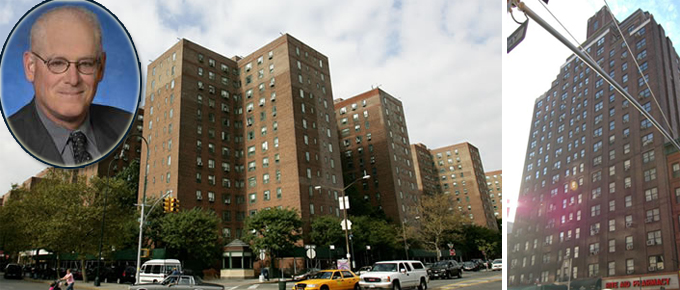[Updated 2:47 p.m.] A New York state appellate court ruled yesterday that the landmark decision to protect rent-stabilized
tenants in the Stuyvesant Town and Peter Cooper Village case should be applied retroactively, a move
that could open the floodgates to millions of dollars in rent overcharges at other developments.
The new case, in Which The Court actually upheld the landlord’s lower court victory, involved a
Manhattan couple looking to overturn a prior rent-decontrol ruling at 56 Seventh Avenue in the West
Village. The tenants argued that the Stuy Town case, called Roberts vs Tishman Speyer, where Roberts was a tenant, should allow them to have their market-rate apartment rents refunded in the form of overcharges.
“The Court of Appeals, when they decided Roberts , specifically left open the question of retroactivity,”
said attorney Sam Himmelstein, who represented the tenants in the new case. “Landlords have been
making motions to dismiss these cases saying that it shouldn’t be applied retroactively. Even though we
lost the case, it’s a massive victory for tenants at large.”
According to court records, the plaintiffs, Bernard and Cora Cahan Gersten, originally moved into a 20th-
floor apartment at 56 Seventh Avenue in 1968, as rent-stabilized tenants. By 1979, the couple took over
a second apartment adjacent to the first and by 1995, took over a third apartment, combining all three
into one large unit.
In 1999, the prior landlord, Alverjan Holding, filed a petition to deregulate the original apartment, and
the state Division of Housing and Community Renewal, granted that deregulation, but the building was
receiving J-51 benefits, which are tax breaks given to landlords who make significant upgrades.
Court records show the tenants were making more than $175,000, which is the maximum amount
of income allowed for rent-controlled tenants, and by September 1999 they signed a four-year lease
with the landlord to pay a combined $5,000 rent. By 2002, the landlord entered into a nine-year lease
extension with the tenants to pay $6,000 a month.
By 2008, the building was sold to RREEF, a subsidiary of Deutsche Bank, which never applied for J-
51 benefits, which means it never sought a direct benefit from the tax breaks. By December 2009,
following the Court of Appeals ruling that said tenants had been overcharged at Stuy Town, the Gerstens
filed suit against the new and old landlords, alleging they had been overcharged for rent since 1999.
Last September, a Supreme Court judge granted a motion by the landlords to dismiss the lawsuit, saying
the statute of limitations had run out to overturn the luxury decontrol by DHCR and that the original
ruling could not be overturned after 11 years.
The court, however, ruled that the defendants could not just limit the ruling to disputes with new
tenants after the Stuy Town ruling.
“The impact of retroactive application of Roberts would be to protect, where applicable, tenants
from rent increases in excess of those allowed by the RSL [rent stabilization law],” wrote Judge
Dianne Renwick, on behalf of the court in the Gersten case. “A contrary ruling would allow landlords
throughout the city to collect rent in excess of those allowed by the RSL based upon a faulty statutory
interpretation.”
The issue of retroactive rents has been a sore point among landlords in New York. A bill was recently
introduced that would allow landlords to just pay back taxes in cases where they illegally deregulated
J-51 apartments.
Wolf Haldenstein attorney Alex Schmidt, who represents thousands of tenants at Stuyvesant Town and
Peter Cooper Village in the Roberts case, declined to comment, saying he’s still waiting for an appellate
court ruling in that case.
Belkin Burden attorney Magda Cruz, who represented both landlords, was not immediately available for
comment. Deutsche Bank officials decline to comment. Officials from the Real
Estate Board of New York were not immediately available for comment.
